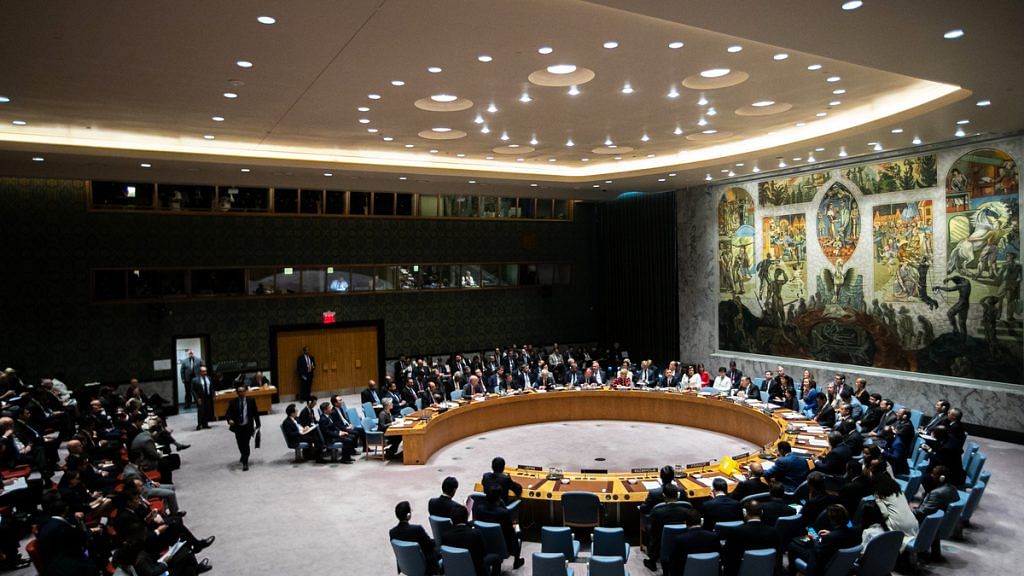New Delhi: The United Nations Security Council (UNSC) will for the first time in more than four decades hold closed-door consultations on the Jammu and Kashmir issue Friday, following India’s decision to revoke the special status of the state.
Although this is not seen as a welcome development for India as it maintains Kashmir is a bilateral issue with Pakistan, analysts said the consultations are not expected to amount to much.
The meeting is taking place at the behest of China that wanted all 15 members of the UNSC to discuss the recent move taken by the Modi government to scrap Article 370 and 35A from Jammu and Kashmir and bifurcate the state.
“It won’t amount to much, especially as most permanent UNSC members won’t be supportive of further action. Still, for India, which doesn’t want any internationalisation of the issue at all, even this informal consultation among UNSC members will not be a welcome development,” said Michael Kugelman, Deputy Director of Asia Programme and Senior Associate for South Asia at the Washington-based think tank Wilson Centre.
The closed-door meeting at the UN headquarters in New York, which will be held in complete secrecy, has been proposed by Security Council President Joanna Wronecka of Poland. Poland currently holds the UNSC Presidency, which is accorded on a rotation basis.
This is one of the “rarest of rare” occasions when the UN will be discussing the Kashmir dispute that was and continues to remain of the root causes of animosity between India and Pakistan since Partition in 1947.
What happens at UNSC closed-door consultations?
In a ‘closed-door consultation’, the proceedings of the meetings are not recorded nor is a public statement made. But if the UNSC does issue a statement, it won’t augur well for India while Pakistan’s lobbying efforts and its long-standing intention to take up Kashmir at the UN high-table will be surely be seen as a diplomatic victory for Islamabad.
According to official sources, a press note can be issued at a later date but that will require the assent of all five permanent UN members — US, UK, France, Russia and China.
This is the first time since December 1971 that India-Pakistan question has been used for a closed-door UN meet. It was not used in 2009 when Pakistan integrated Gilgit-Baltistan into Pakistan.
Since the 1972 Simla Agreement, India has maintained that Kashmir is a bilateral dispute between India and Pakistan that laid guidelines for solving the issue between both countries.
Why China wants a closed-door meeting on Kashmir
Being an all-weather ally of Pakistan and a strategic partner, China decided to rake up the issue at the UN based on a letter that Pakistan has sent to the council.
Beijing wanted to discuss the matter as part of the formal consultation process but it was opposed by France and hence it was decided to be taken up as part of the closed-door talks, sources told ThePrint.
The closed-door consultations were expected to take place Thursday but since the schedule for that day was already finalised and the Kashmir issue came up at the last moment, members decided to hold the consultations Friday, sources added.
Except for China, all other members have by and large maintained that the Kashmir issue is an internal matter of India and that any kind of intervention is not required even as the international community urged both New Delhi and Islamabad to exercise restraint.
In his meeting with his Chinese counterpart Wang Yi earlier this week, External Affairs Minister S. Jaishankar had apprised Beijing that the constitutional change was India’s domestic matter and that it does not alter issues relating to sovereignty. He had also told China that the move would neither affect the Indo-Pak Line of Control (LoC) with Pakistan nor will it change the Line of Actual Control (LaC) between India and China, sources said.
China, on the other hand, had told New Delhi that it continues to remain concerned on the issue and its adverse fallout on the security and stability of the region. China is also upset with the changes made to Ladakh.
A week before Jaishankar’s visit, Pakistan Foreign Minister Shah Mahmood Qureshi was in Beijing and urged China to take up the issue at the UNSC. Islamabad has called India’s move “unilateral and illegal”.
Also read: Don’t live in fool’s paradise, hard to get support against India: Qureshi tells Pakistan
What will happen at the meeting?
All 15 members of the UNSC (five permanent members and 10 non-permanent members) will be part of the meeting but not India and Pakistan as they are not part of the UNSC.
The council will be briefed by United Nations Assistant Secretary-General for Peacebuilding Support, Oscar Fernandez-Taranco of Argentina, and the UN Military Adviser for Peacekeeping Operations Carlos Humberto Loitey.
“The meeting is expected to toe the UNMOGIP line where India is seen as a recalcitrant party and non-cooperative … The main issue is that like in January 1948, India is not in the chamber when council discussion will take place,” a former Indian Ambassador the UN, who refused to be named, told ThePrint.
Also read: Kashmir remains shut for 12th consecutive day, govt employees told to return to work
